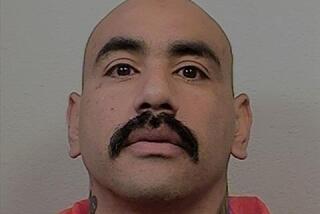Mother’s Push for Justice Reopens Case : Inquiry: Rebecca Ennis hired investigator who found new evidence in the slaying of her son. Prosecutors defend their actions.
- Share via
From the start, the shooting of James Vleck has baffled authorities.
When his body was found in a Ventura apartment house in August, 1993, Vleck was clutching an unopened knife in his hand but had no identification on him.
Police and coroner’s officials combed the Silver Strand area and talked with surfers, skateboarders and business owners before they found someone who could recognize the 23-year-old former Oxnard man.
But an even bigger puzzle for them, authorities later discovered, was finding the truth behind Vleck’s shooting.
First there was the story of Dean Soto, the Ventura nightclub disc jockey who told police he shot Vleck while trying to make a citizen’s arrest. Soto said he pointed a 9-millimeter semiautomatic at Vleck and told him he was under arrest for harassing a woman Soto knew. Vleck, he said, took a swing at him and grabbed the loaded pistol. The gun went off.
Prosecutors spent four months examining the case before deciding they could find no evidence of criminal conduct. It was, they concluded in December, 1993, a citizen’s arrest gone awry. They ruled the shooting accidental and closed the case.
Dissatisfied with the results, Vleck’s mother hired a private investigator. He discovered that prosecutors had never interviewed the only other witness to the shooting.
That witness, Paul Skill, said Vleck never tried to grab the gun. Instead, Vleck was merely trying to move out of harm’s way when Soto shot him, Skill told the private investigator in March. The investigator, Jeff Bogan, also noticed that certain details in a coroner’s report seemed to support what Skill had told him.
Confronted with the new evidence, the district attorney’s office has reopened the case.
The move came as the state attorney general’s office has begun investigating whether local prosecutors abused their discretionary power by not filing charges in the matter initially. Prosecutors defend their probe and their initial conclusion.
“When all is said and done here, I think the record will show we did a good job,” Chief Deputy Dist. Atty. Kevin J. McGee said.
But Vleck’s mother, Rebecca Ennis, doesn’t see it that way. Prosecutors, she said, “just wanted to brush it under the carpet.”
“I not only have to deal with the fact that my son is gone,” said Ennis, who now lives in Arizona, “I have to deal with the fact that I can’t get through to the district attorneys.”
The investigation of Vleck’s death is just one of hundreds each year that prosecutors choose not to pursue in court--decisions that often leave the victims’ families or police officers dissatisfied.
In 1993, Ventura County prosecutors rejected 21% of the 4,380 investigations police brought to them, or 946 cases. The rejection rate as of mid-October was 22%, or 957 cases.
“We’re not typically considered to be an office that shies away from a difficult case,” McGee said.
But the Vleck shooting was riddled with complications.
First, there was the victim’s background. Vleck had a history of drug use and, despite receiving treatment, had been on a binge in the weeks before his death. The autopsy report showed traces of methamphetamine in his body. What’s more, he was carrying a knife the day of his death.
Soto was carrying three loaded handguns and was later convicted of felony drug possession in an unrelated case.
Second, there was the nature of the evidence.
Skill was never fully questioned by police or prosecutors until the case was closed. With no conflicting story, prosecutors did not look for discrepancies that would later emerge from the coroner’s report.
*
Prosecutors would not discuss the details of this case because of the ongoing investigation. But in general, they say they press charges only when they sincerely believe a suspect is “guilty beyond a reasonable doubt.” Otherwise, they say, they stand little chance of winning a conviction.
Police, on the other hand, have a lower legal standard for making an arrest--probable cause that a crime was committed. As a result, the district attorney’s office does not always prosecute every case brought by police.
When that occurs, as it does in one in five felony cases, the cooperative nature of the police-prosecutor relationship can sour, officials acknowledged.
“There are times here at the Ventura Police Department that we feel the case is provable beyond a reasonable doubt, and we just disagree” with prosecutors, said Ventura Police Chief Richard Thomas. Nonetheless, Thomas said the two agencies work hard to smooth out problems and keep the tension to a minimum.
What is clear in this case is that police believe Soto had no business pointing the loaded gun at Vleck.
“The shooting was unnecessary,” said Ventura Police Sgt. Bob Anderson, who commands the major crimes division. “The players there had ample opportunity to summon the police, who are paid to handle disputes of that nature. And we weren’t given that opportunity. It’s a tragedy that should not have happened.”
Soto did not return several phone calls seeking comment for this story. But he gave this version of events in his statement to police the night of the shooting:
The night before, Soto, 30, was attending a barbecue at the East Thompson Boulevard apartment of his girlfriend, Samantha McCranie, when he noticed Vleck behind the house playing with a knife. Vleck had attended McCranie’s barbecue and met her roommates.
Early the next evening, McCranie phoned to tell him that Vleck had returned to the apartment, Soto said. She told him Vleck had climbed through a window, pushed one of her roommates and made a remark that he could rape her if he wanted.
Soto said he quickly went to his girlfriend’s aid, armed with three handguns.
When he saw Vleck and Skill approaching the apartment sometime after 7 p.m. on Aug. 9, Soto reached into his duffel bag and pulled out a .357 Magnum. He said he considered the gun too large for protection, so he reached back into the bag and pulled out the 9-millimeter. He said he unholstered that gun and slipped it behind his back.
He confronted the men as soon as they came through the front door and ordered them to “freeze,” Soto said. But Vleck, Soto told police, swung at him and grabbed the gun.
That is how he was shot, Soto said.
Skill, who came into the apartment with Vleck, recalled events differently, according to police statements taken in June, nearly a year later. In the moments after the shooting, police interviewed Skill briefly and took down a statement that seemed to confirm Soto’s story.
But when Bogan, the private investigator, contacted Skill months later, he heard a different story. The investigator relayed the information to police, who conducted another interview with the eyewitness.
Skill told the police:
He picked up Vleck hitchhiking earlier that same day and drove him around as he ran some errands. Vleck wanted to go back to the apartment to get a tattoo by one of the women in the apartment, Skill said.
When they arrived at the apartment with Vleck carrying his tattoo box, everything seemed fine. In fact, Skill said he thought Vleck had been staying there because McCranie met them out front and escorted them inside the apartment.
But as soon as he and Vleck entered the living room, Soto appeared out of nowhere and held the loaded pistol on them. Skill said he thought they had walked into a robbery in progress.
Soto got up really close to Vleck with the gun, pressing the gun into his body, Skill said. He said Vleck tried to move out of the way but was shot.
*
When police found Vleck, he had his knife clutched in his hand. It was never opened.
An autopsy revealed that Soto’s gun was indeed pressed against Vleck’s left biceps when he was shot, Ventura County Medical Examiner Ronald L. O’Halloran said. It also showed that Vleck’s arm was not extended, as if he had been lunging out to grab at something, but was down by his side at the time of death, said the coroner.
But O’Halloran said prosecutors had not asked him to review the witness statements to determine which one was more consistent with the autopsy.
“I haven’t been asked that question,” he said.
In reopening the case, prosecutors interviewed Skill for the first time this month. While they continue to investigate, the state attorney general’s office has suspended its own inquiry.
Vleck’s mother, Rebecca Ennis, who has spent nearly $20,000 in her campaign to bring the case to court, is happy prosecutors are reconsidering the evidence.
“When my son was laying there, I told him I was going to get justice,” she said. “I can’t give up. I am going to die trying.”
More to Read
Sign up for Essential California
The most important California stories and recommendations in your inbox every morning.
You may occasionally receive promotional content from the Los Angeles Times.










